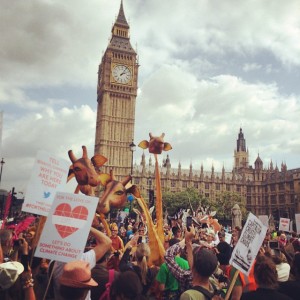Ian Short
September 22, 2014
May 22, 2014
January 20, 2013
Heat, by George Monbiot
I had avoided reading this book, fearing it would depress me too much. Then E read it, so I thought I should too. It’s about a programme for reducing the UK’s carbon dioxide emissions to a level that may avoid some of the disasters of climate change. Monbiot believes that the targets can be met for all aspects of our comfortable lives except flying (and other means of long-distance, fast transport). Aviation produces so much pollution that we can’t meet our reduction targets with current levels of aviation (unless we sacrifice other more important aspects of our lives, like heating).
At least, this is what Monbiot thought when the book was written in 2005 (and updated 2007). The situation is much worse now, so maybe he isn’t so optimistic.
E and I don’t fly. Next we are going to work on our home energy consumption, to plug our leaky house. Then maybe switch to an eco-car (or no car? unlikely). And holiday in Bletchley.
Here’s a quote from the last chapter.
Similarly, when considering what might happen to people in my own country or in other parts of the rich world – in which the human impacts of global warming will be delayed both by our more forgiving climate and by the money we can spend on our protection – I have found the likely effects easy to catalogue but almost impossible to imagine. I can understand, intellectually, that life in this country might not be the same in thirty years’ time as it is today; that if climate change goes unchecked it could in fact be profoundly and catastrophically different. But somehow I have been unable to turn this knowledge into a recognition that my own life will alter. Like everyone who has been insulated from death, I have projected the future as repeated instances of the present. The world might change, but I will not.
I recognise my own feelings particularly in the last few sentences. Perhaps these are the reasons why we in the UK are doing so little about an issue of earth-shattering significance.
January 18, 2013
Good Energy
Just switched energy supplier to Good Energy at long last. They are one of the most environmentally sound energy suppliers in the UK at the moment.
December 11, 2012
Christmas junk
George Monbiot’s article on trashing the planet for Christmas:
September 29, 2012
Greg Rutherford victory parade
Greg Rutherford, the Olympic gold medalist in long jump, had a victory parade in Woburn Sands yesterday afternoon (he lives here, on our street). He travelled in an open top bus from Frost’s Garden Centre to Mowbray Green and back again. On top of the bus was Greg, some photographers, the mayor, and a few others, probably family. The streets were lined with flag wavers, a lot of them children from the local schools. Ellie, Isi, and I stood outside our house as the bus came past. We were in an empty patch for onlookers, as we live near Mowbray Green, where people were gathering instead. I held Is high in the air and she got a wave from Greg. E was cursing me for not standing in front of her so that she could get a photo of Greg with Is in the foreground.
There was a small ceremony at Mowbray Green. Usually Mowbray Green, which is a small patch of grass with trees by a busy road, is occupied by a few teenagers. Instead it was filled with the people of Woburn Sands. The mayor thanked the garden centre, the guy who lent the open-top bus (who has an open-top bus?), and various others. Greg thanked everyone. There is now a plaque on the green (an 8.35 metres long thing) celebrating Greg’s achievement. People cheered, Isabel cried, and so we took our leave. Apparently Greg had to shoot off straight after to appear on Channel 4’s The million pound drop.
April 21, 2012
Tesco in Woburn Sands
Since January I’ve lived in Woburn Sands, on the outskirts of Milton Keynes, on the boundary of Buckinghamshire and Bedfordshire. An empty shop on the high street – previously a restaurant with the terrible name ‘Woburn Zens’ – has received the attention of Tesco, who have submitted a planning application to install one of their Metro stores there. Several of the other high street shops (including, off the top of my head, Co-op, a butcher, a baker, and another small food store) are involved in a campaign to dissuade Milton Keynes Council from allowing the plans to go ahead. Some local residents have also campaigned against the store.
I oppose the creation of a new Tesco store, so I wrote to the relevant Milton Keynes Planning Officer. Here’s my message, minus some pleasantries.
I recently moved to Woburn Sands with my family from another similar small town (Neston, Cheshire). We chose Woburn Sands precisely because of its strong sense of local community, supported by local businesses. A new Tesco would be a massive backwards step for the region. In our old town Neston, a new Sainsbury’s caused local food suppliers to close down. I’m worried that the same will happen in Woburn Sands. We absolutely don’t need a new small shop the same size as Co-op. It would be a tragedy if the Co-op came under threat: the Co-operative group is an organisation with a decent ethical base, in fitting with the community here. Tesco, on the other hand, focus on low prices and mass production, which causes harmful farming practices that reduce biodiversity and force small farms out of business.
People will no doubt shop in Tesco: it’s cheap, convenient, and they advertise a lot. And Tesco are large enough to weather competition with local businesses until the local businesses have to give way. Tesco will benefit from this application to an affluent area like Woburn Sands, but the community will not. Although we won’t move away from Woburn Sands once a Tesco opens, I will consider it a black mark on Woburn Sands when we look to buy a house within the next couple of years.
For this day and age, and particularly in comparison to Milton Keynes in general, Woburn Sands has a rich diversity of small, mostly independent shops. In some ways it is similar to my previous town, Neston. Both towns are of a similar size, and both benefit from proximity to universities (the Open University and Liverpool Veterinary School). Neston, however, has a Tesco Metro, an Aldi, and then a medium sized Sainsbury’s was introduced a couple of years ago. Sainsbury’s caused the local grocers and butchers to close down (who, in the face of competition from Tesco and Aldi, were only clinging on to existence anyway). Neston’s high street is pretty crap, and the new Sainsbury’s attracts visitors from local villages who bring traffic. I expect Tesco Metro in Woburn Sands will have a similar effect: local smaller shops will suffer, or close, and there will be more traffic.
Tesco will offer a slightly wider range of products than the local shops, and they will be cheaper. How broad a variety of products do we need in order to live happily? In my opinion, the Co-op and other smaller shops provide sufficient variety already, although a person who is used to larger supermarkets may disagree. In any case, if you are prepared to drive (and who isn’t in Milton Keynes?) then every UK shop you can think of is available within a few miles, in gargantuan size. Here’s an article in the Guardian on this kind of issue.
Tesco threatens the existing Co-op. The Co-operative group is a large democratic organisation owned by its members, which supports ethical trading. For these reasons I generally prefer to shop in Co-op than other supermarkets. Tesco is the third largest retailer in the world, and has a terrible environmental record. The most obvious reasons are that it uses large energy inefficient stores, which encourage people to travel by car, and which generate huge amounts of waste in packaging and food. The environmental effects of transportation to supermarkets are large compared to more locally based schemes. Most if not all of these criticisms could be levelled at all supermarkets, however, including Co-op.
The most significant problem with supermarkets perhaps (and this applies particularly to Tesco because of its size and philosophy) is the effect they have on farming. In order to sell cheap goods, supermarkets force farmers to compete for the lowest possible prices. This leads to budget farming: large-scale (small farms cannot compete), use of dangerous pesticides (supermarkets exploit poor countries with few regulations on pesticides), reduced biodiversity (crops of the same variety are produced, en masse), environmental destruction, huge carbon emissions (partly in transportation – again, it is cost rather than environmental impact that dictates farming practices), low wages, and poor working conditions. Essentially, the consumer may pay little, but the environment and farmer pick up the rest of the cost.
Responding to the mood in the UK, Tesco has made some efforts to improve its environmental credentials. On the other hand, the environmental movement is weaker in China, and, accordingly, Tesco has an awful environmental record over there.
The results of the planning application should be revealed within a couple of weeks, and I’ll post them here.
March 11, 2012
March 6, 2012
July 23, 2011
The Code
The three part BBC series The Code about maths begins next Wednesday. Presented by Marcus du Sautoy, and supported by the Open University. We have created some Open University hexagonal shaped cards to accompany the series. They are meant to be drinks mats (think beer mats). I’m worried they will be too thin to be convincing drinks mats. Hope I’m wrong.
There is a treasure hunt accompanying the series. Information on The Code website.




